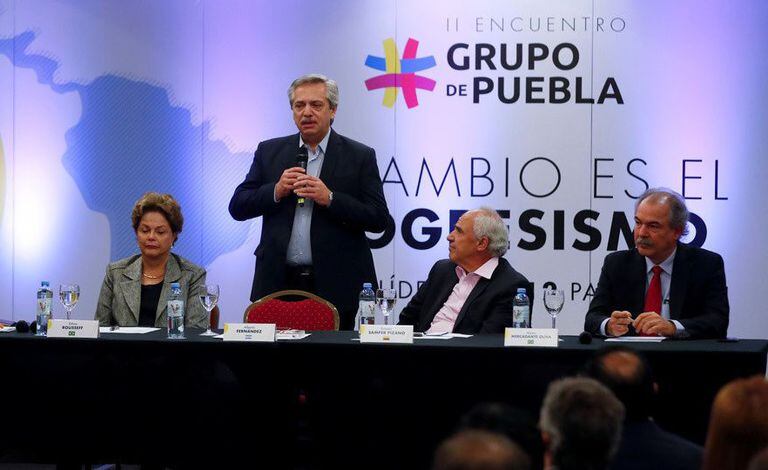Latin American presidents and former presidents during a meeting of the Puebla Group in 2019. GRUPO DE PUEBLA
It was the fifth meeting of the Puebla Group, a platform of progressive Latin American leaders established in the Mexican city in July 2019, but this Friday became probably the most significant forum of the organization, due to the presence - more than 60 presidents, former presidents, foreign ministers and leaders of the left - and for the urgencies imposed by the health crisis of the covid-19.
Latin America, defend the promoters of the event, must find a way to greater regional integration.
The coronavirus pandemic has exposed the structural weaknesses of the different countries and cooperation becomes more necessary in these circumstances, as well as the social agenda.
From Argentina to Spain, passing through Mexico, Brazil, Colombia, Ecuador, Chile or Bolivia, the event was, in short, a great call for unity.
The Mexican Foreign Minister, Marcelo Ebrard, opened the meeting with precisely that idea, applying it to the specific challenge of the vaccination campaigns against the virus that in Latin America began last Christmas in a very uneven way, with delays and interruptions.
The head of the country's diplomacy established the production plan for the doses of the pharmaceutical company AstraZeneca, which, as agreed, will be distributed by Mexican and Argentine laboratories for the entire continent, as an example of the need to "recover joint work in science and technology ”.
"It will be the cheapest vaccine and for many countries the only one," he said.
Ebrard recalled that each Government "is trying to access the vaccine in very unfavorable conditions" and against this, he maintains, it is only possible to "increase the technological autonomy" of the region.
Unity and integration were two words also used by the president of Argentina, Alberto Fernández.
"The pandemic has meant that we are all running each one on their own," reasoned the president, who believes that the collaboration could have even allowed a joint negotiation of vaccines.
"Divided is more difficult, unity is not a debt that comes to us because of the legacy of our heroes, but rather it is something that basically suits us," he continued through a recorded message.
The Spanish Minister of Foreign Affairs, European Union and Cooperation, Arancha González, also spoke at the Puebla Group forum.
The representative of the Socialist Government of Pedro Sánchez reflected on the meaning of a progressive project that, in her opinion, has to prioritize the fight against climate change, digitization, equality and feminism and a growth model “that does not leave nobody behind ”.
"This is not a slogan," emphasized the Foreign Minister, it is the idea that we cannot continue to grow, worsening the gap in our societies. "
González's presence at the meeting is relevant beyond the symbolic because Spain is one of the main interlocutors of the Latin American countries and its gateway to Brussels.
The former President of the Government José Luis Rodríguez Zapatero, one of the promoters of the Puebla Group, stressed the importance of the region having a deeper dialogue with the European Union.
In his opinion, "the road to the unity of Latin America would be the great challenge of these bicentennials and the great challenge of the crisis of the pandemic."
Meanwhile, he expressed concern about access to the vaccine and the threats to equity that this process poses.
The Secretary General of the United Nations, António Guterres, sent a letter to the participants to share a background message on the social gap and the challenges of integration between countries.
"A delay in access to the vaccine cannot be allowed to further widen the current enormous inequalities globally," he wrote.
Some words that although he had already spoken on other occasions coincide with the proposals of the forum.
The group's priorities are essentially three.
They were verbalized by former Colombian president Ernesto Samper during the meeting, moderated by Chilean politician Marco Enríquez-Ominami.
The first is "revitalizing democracy";
the second consists of "taking a great social leap hand in hand with a basic income";
the third is an alternative development model.
"None of this", according to Samper, "will be possible without integration."
The veteran leader proposes to "depoliticize international relations" and "strengthen multilateralism."
Barriers in Latin America have been raised mainly to favor trade, he recalled, but it has not happened to facilitate mobility and services.
"Never, as with the pandemic, has integration been so necessary and never has the region been so disintegrated."
Former Brazilian President Dilma Rousseff elaborated on the "social injustices" suffered by the most vulnerable sections of the population, while her predecessor, Luiz Inácio Lula da Silva, alluded to the movements that began in the recent past, when the so-called Bolivarian axis dominated Latin America . Now the political objective of the Puebla Group is precisely to encourage the return to power of those options. As happened in October in Bolivia and now following Ecuador. The country holds elections next Sunday and a candidate sponsored by Rafael Correa, Andrés Arauz, is contesting the presidency with the conservative Guillermo Lasso.

